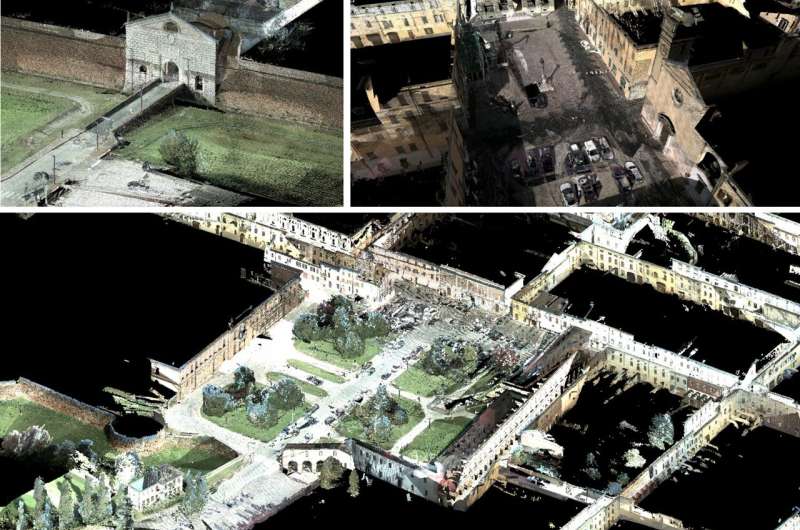
Offering citizens information that promotes physical accessibility with the help of technology and navigation devices would make cities smarter and more inclusive. A young researcher at Politecnico di Milano has used Artificial Intelligence (AI) to identify the differences between streets and pavements made of cobblestones, sanpietrini and bricks, with widely varying heights and widths, which characterize and make historical cities typical but also are an element of difficulty for the elderly and people with motor disabilities.
The research, published in the International Journal of Applied Earth Observation and Geoinformation, used a mobile mapping system, specifically, in this case, a car equipped with instrument provided by Leica Geosystems Italia, for surveying and mapping the small town of Sabbioneta, which has been, together with Mantua, a UNESCO World Heritage Site since 2008 and is an emblematic example of a Renaissance village enclosed within historic walls.
“Starting from the collected data or point clouds, i.e., millions and millions of points distributed in the surveyed space that allow us to obtain measures and three-dimensional representations of what surrounds us, e.g. houses, streets, squares, pavements and various objects, it is possible to identify, with the help of Machine Learning, the most accessible trajectories and paths in a historical urban context,” Daniele Treccani, researcher at the UNESCO Research Lab in Mantua at Politecnico di Milano, explained.
“Machine Learning (ML),” Andrea Adami, Professor of Topography and Cartography at Politecnico di Milano, explained, “allows a complex neural network attempting to simulate the functioning of the human brain to ‘learn’ from a large amount of data previously structured by an operator. After the learning phase, it is possible, through a combination of inputs, to recognize and classify objects within the data, automatically and with no human intervention.”
“In this case,” Treccani continues, “the elements identified to assess physical accessibility were pavements, which are users’ preferred routes, and roads. The calculated attributes included width, height, slope, and paving material. The ML method showed good reliability of results (89%), which were verified in situ.”
“Thematic urban maps were then produced in QGIS, accessible routes were calculated and an update of OpenStreetMap was data proposed. The work on Sabbioneta made it possible to test and demonstrate the importance of AI methods for managing accessibility in historic city centers.”
The automatic extraction of geometric and space georeferenced information can be extended to other urban elements and be used for tourism accessibility and navigation applications, as well as for creating map bases for Plans for the Elimination of Architectural Barriers (PEBA) or Urban Accessibility Plans. In general, the data collected and processed can be useful for the construction of City Models and digital models of historic city centers.
Daniele Treccani is currently working on extending his research to data from other urban survey systems, such as UAS (drone) photogrammetry, laser scanner survey systems from aircraft or with portable systems (backpacks or handheld), and continues his collaboration with the University of Vigo (Spain), with which he carried out part of the research.
Starting from this research, the theme of accessibility has also fostered collaboration with the Diocese of Mantua and the Italian Bishops’ Conference and in the development of a Research Project of National Interest (“PRIN”) with the University of Brescia and the University of Modena and Reggio Emilia.
More information:
D. Treccani et al, Automating the inventory of the navigable space for pedestrians on historical sites: Towards accurate path planning, International Journal of Applied Earth Observation and Geoinformation (2023). DOI: 10.1016/j.jag.2023.103400
Citation:
Experiments with AI to make historic city centers accessible (2023, December 1)
retrieved 2 December 2023
from https://techxplore.com/news/2023-12-ai-historic-city-centers-accessible.html
This document is subject to copyright. Apart from any fair dealing for the purpose of private study or research, no
part may be reproduced without the written permission. The content is provided for information purposes only.
Stay connected with us on social media platform for instant update click here to join our Twitter, & Facebook
We are now on Telegram. Click here to join our channel (@TechiUpdate) and stay updated with the latest Technology headlines.
For all the latest Technology News Click Here
For the latest news and updates, follow us on Google News.
